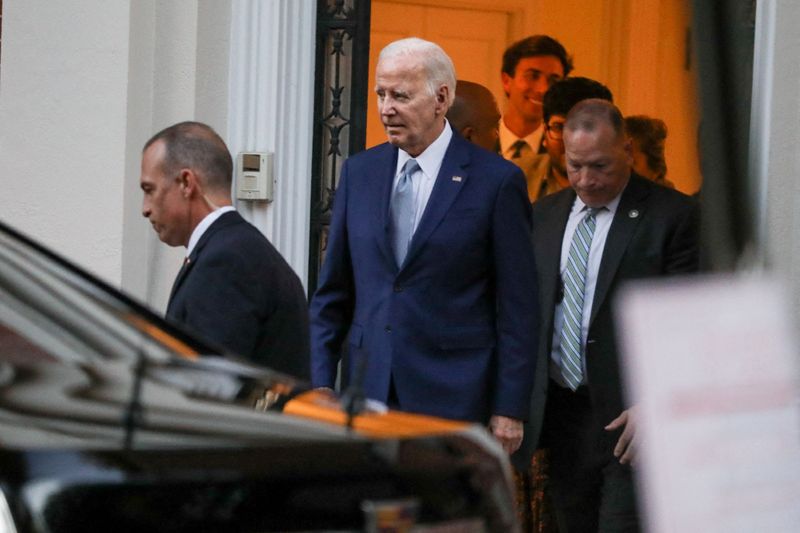By Steve Holland, Nandita Bose and Trevor Hunnicutt
WASHINGTON (Reuters) -As president, Joe Biden has relied heavily on Teleprompters and pre-written scripts for his public speeches, a mostly disciplined approach that’s been in sharp contrast to his decades of free-wheeling, sometimes less-than-diplomatic remarks.
But holding a microphone in a room of donors who support his 2024 re-election campaign, Democrat Biden in recent months has dug into the Chinese government, the Republican Party and U.S. ally Israel for its bombing of the Gaza Strip.
He’s likely just getting started. The 2024 campaign trail will include dozens of fundraising events.
Biden first told donors in June that he considered Chinese President Xi Jinping to be a dictator, prompting howls of protest from Beijing.
Biden, 81, said at a fundraiser in December that he might not have launched his re-election bid if Republican Donald Trump, who he defeated in 2020, was not also running, a discordant message for a campaign battling concerns about his age and low approval ratings. Trump is 77.
Then, on Dec. 12, Biden said he brought up Israel’s “indiscriminate” bombing in a private discussion with Prime Minister Benjamin Netanyahu, the first time Biden has publicly expressed real frustration with Netanyahu’s government since the Oct. 7 Hamas attacks and Israel’s retaliatory strikes on Gaza.
Biden’s open-mic disclosures are clashing with the White House system built to keep him on script.
The comments sometimes baffle, rankle, or worry his aides, who are forced to explain or contradict them later.
They often struggle to shift attention back to the administration’s message of the day, or explain why Biden’s comments are seemingly at odds with official U.S. policy.
As Biden himself has acknowledged, his candor can sometimes cause problems. “No one ever doubts I mean what I say,” Biden told donors last year. “The problem is I sometimes say all that I mean.”
The White House and the Biden re-election campaign declined to comment.
WHAT DID BIDEN MEAN?
Biden’s use of the word “indiscriminate” raised questions about the U.S. view of the legality of Israel’s campaign, which has killed more than 22,000 people, according to health authorities in Hamas-run Gaza.
White House and State Department officials were grilled by journalists on what Biden meant, exactly, and whether he speaks for the United States government or not.
It’s not just a question of semantics. The Biden’s administration’s own policy prohibits arms to be transferred to other nations for genocide, crimes against humanity, breaches of the Geneva conventions or serious violations of international law. The latter prohibits “indiscriminate attacks.”
Biden was just expressing concern that Israel be careful and mindful of civilian casualties, spokesperson John Kirby told reporters the next day.
Biden also told donors at the same fundraiser that he told Netanyahu his government needed “to change,” and he had said in the past that “I don’t agree with a damn thing you have to say.”
As Biden warmed up to the topic, reporters were asked to leave the room by Biden’s aides, but declined to do so.
Kirby, pressed the next day to clarify, reached for a more diplomatic tone. “The president realizes that Israel is a powerful, vibrant democracy, and any change in the government is going to have to be determined by the Israeli people,” he said.
The comments on Israel instantly became a top news story of the day, displacing a visit to Washington by Ukrainian President Volodymyr Zelenskiy, who was pleading with Republicans in Congress to approve more funding to repel Russia’s invasion.
Consistency in messaging is important, particularly in matters of international diplomacy, foreign policy experts say.
“At some point if what you say in your fundraising speeches is very different from what you’re saying in your other public appearances it’s a problem,” said Lanhee Chen, a long-time political operative and senior fellow at the Hoover Institution at Stanford University.
QUASI-PUBLIC EVENTS
Biden’s public speeches are carefully crafted and vetted, spontaneous exchanges with reporters are limited and he rarely holds full-blown news conferences. When he does, some of his answers appear to be written down ahead of time and read aloud.
Some aides say quasi-public events like fundraisers allow Biden to test-drive lines and thoughts that he may use later in public with a friendly crowd.
Biden’s re-election campaign could actually use more of this type of aggressive language, especially pushing back on Republican attacks, several donors told Reuters.
“Anytime he sounds more aggressive or takes an aggressive stance, his (approval) numbers go up,” said a source who helps Democrats raise money.
“This is the same nervous Nellie, cautious crew that advised Hillary (Clinton) to stay on message,” the source said of White House aides who would prefer that the president stick to the script. “Biden needs to come out and tell people what he thinks, it is effective when he does that.”
During a fundraiser for her failed 2016 presidential bid, Clinton referred to half of Trump supporters as “deplorables,” then quickly said publicly she regretted the comment.
The Biden campaign and the Democratic Party raised significant hauls in the two quarters since Biden announced his re-election bid in April of 2023; $72 million in the second quarter and $71 million in the third, outpacing Trump and Republicans.
While a small pool of reporters traditionally follow U.S. presidents around in public, recording their every utterance or stumble, whether or not to allow press to these closed-door events is a matter of personal choice.
Following a procedure he adopted during his 2020 campaign amid concerns about the influence of big-money donors, Biden allows limited access to a small number of reporters as long as they do not take video or pictures or use the audio for broadcast.
Trump has barred reporters from similar events.
Read Reuters’ latest news on the 2024 US elections:
(Reporting By Steve Holland, Nandita Bose and Trevor Hunnicutt; Editing by Heather Timmons and Grant McCool)
